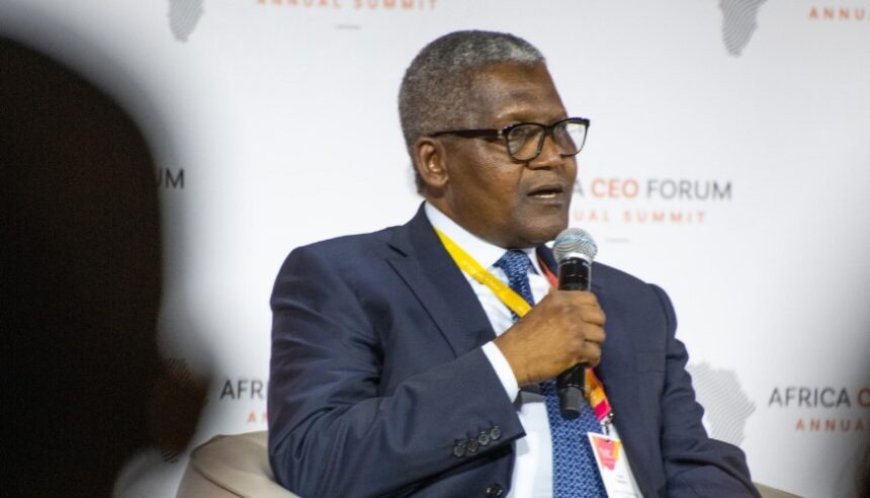Dangote Seeks Legal Backing For ‘Nigeria First’ Policy

Africa’s leading industrialist, Aliko Dangote, and other manufacturers warn that Nigeria’s industrial trajectory is at risk unless the federal government swiftly enacts the proposed ‘Nigeria First’ Policy, a move they say is critical to reviving manufacturing, boosting GDP, and creating millions of jobs.
Dangote has passionately pleaded with the federal government to urgently legislate and implement the proposed ‘Nigeria First’ Policy, describing it as a critical lever for revitalising the nation’s manufacturing sector.
According to him, the legislation holds the keys to accelerating the nation’s economic growth and creating sustainable employment opportunities.
Dangote stressed that current manufacturing contributed less than 10 per cent to Nigeria’s GDP, a share stubbornly unchanged for more than a decade, underscoring the urgency of policy action to reverse decades of import dependence and industrial underperformance.
Speaking at the fifth Adeola Odutola lecture organised by the Manufacturers Association of Nigeria (MAN) with the theme, ‘Nigeria First: Prioritising Made-in-Nigeria’ held yesterday in Lagos, Dangote said, the ‘Nigeria First’ policy was forward-looking and an appeal for industrial self-sufficiency, economic resilience and greater competitiveness in the global market, saying, “it is a call to action for sustained development and transformation led by our manufacturers.”
Dangote stated, “If implemented effectively, it can boost GDP, reduce import dependence, and generate jobs across the country.”
He emphasised that the policy represented a transformative framework capable of propelling Nigeria toward industrial self-sufficiency and global competitiveness.
Drawing parallels with global economic powerhouses such as China, India, and the United States, Dangote underscored the importance of adopting a locally tailored industrial policy to protect and promote domestic industries.
Dangote outlined some strategic priorities that manufacturers expected from the Nigeria First framework among which is: to legislate the Nigeria First Policy by enacting it into law with enforceable compliance mechanisms; Ensure Policy Stability and Long-Term Commitment – Avoid policy reversals to foster investor confidence; Develop a National Supplier Registry–Create a verified database of local manufacturers for government procurement; Drive Consumer Engagement and National Pride–Launch a robust ‘Buy Made in Nigeria’ campaign and Incentivise Backward Integration-to support companies investing in local raw materials and Research and Development.
As part of the strategy, Dangote also urged the government to address Infrastructure and Energy Deficits by improving access to affordable power and efficient logistics, enhancing access to Finance by lowering interest rates and expanding funding for manufacturing enterprises, and leveraging AfCFTA Opportunities by strengthening export capacity to boost regional competitiveness.
The Industrialist also cited the collapse of Nigeria’s once-thriving textile industry, which employed over 500,000 people across 180 mills at its peak, as a cautionary tale of the dangers of unchecked importation and weak policy support.
He stressed that the Nigeria First Policy must transcend political cycles and rhetoric to become a binding national strategy.
The Minister of Industry, Trade and Investment in Nigeria, Dr. Jumoke Oduwole, urged the entire manufacturing and industrial sectors to embrace the African Continental Free Trade Area as a key priority.
She stated that “we are actively negotiating to ensure that your products have access to markets throughout the continent. This commitment aligns with the vision of President Bola Tinubu’s administration to support your growth and enable you to achieve significant scale across Africa.”
The president of the Manufacturers Association of Nigeria, Otunba Francis Meshioye, said, “The theme is of great importance to us. It speaks directly to the choice we must make as a nation. The ‘Nigeria First’ policy is not merely an industrial ambition. It is a matter of national economic survival.
“For decades, we have relied on a development model built around import dependence and weak enforcement of local patronage obligations.
This model has delivered neither resilience nor inclusive growth. Instead, it has contributed to the systemic underperformance of our industries.”
Meshioye pointed out, “If we do not intentionally support our manufacturers, we will not be able to compete globally. It is unsustainable for Nigeria to continue subsidising the production and employment of other nations through unchecked imports. In contrast, our factories continue to record low capacity utilisation and serial underperformance.”









